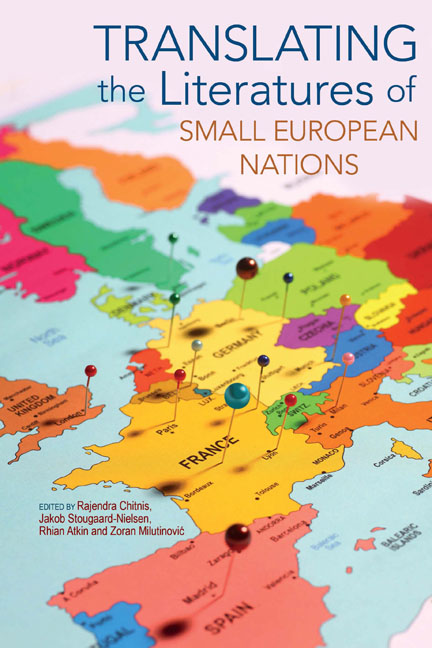Book contents
- Frontmatter
- Contents
- Acknowledgements
- Introduction
- 1 The Global Presentation of Small National Literatures: South Slavs in Literary History and Theory
- 2 Translators as Ambassadors and Gatekeepers: The Case of South Slav Literature
- 3 Supply-driven Translation: Compensating for Lack of Demand
- 4 Literature as Cultural Diplomacy: Czech Literature in Great Britain, 1918–38
- 5 Exporting the Canon: The Mixed Experience of the Dutch Bibliotheca Neerlandica
- 6 Creative Autonomy and Institutional Support in Contemporary Slovene Literature
- 7 Strategies for Success? Evaluating the Rise of Catalan Literature
- 8 Gender, Genre and Nation: Nineteenth-century Swedish Women Writers on Export
- 9 Translating as Re-telling: On the English Proliferation of C.P. Cavafy
- 10 Criminal Peripheries: The Globalization of Scandinavian Crime Fiction and Its Agents
- 11 Literary Translation and Digital Culture: The Transmedial Breakthrough of Poland's The Witcher
- 12 Towards a Multilingual Poetics: Self-translation, Translingualism and Maltese Literature
- 13 Does Size Matter? Questioning Methods for the Study of ‘Small’
- Coda: When Small is Big and Big is Small
- Index
2 - Translators as Ambassadors and Gatekeepers: The Case of South Slav Literature
- Frontmatter
- Contents
- Acknowledgements
- Introduction
- 1 The Global Presentation of Small National Literatures: South Slavs in Literary History and Theory
- 2 Translators as Ambassadors and Gatekeepers: The Case of South Slav Literature
- 3 Supply-driven Translation: Compensating for Lack of Demand
- 4 Literature as Cultural Diplomacy: Czech Literature in Great Britain, 1918–38
- 5 Exporting the Canon: The Mixed Experience of the Dutch Bibliotheca Neerlandica
- 6 Creative Autonomy and Institutional Support in Contemporary Slovene Literature
- 7 Strategies for Success? Evaluating the Rise of Catalan Literature
- 8 Gender, Genre and Nation: Nineteenth-century Swedish Women Writers on Export
- 9 Translating as Re-telling: On the English Proliferation of C.P. Cavafy
- 10 Criminal Peripheries: The Globalization of Scandinavian Crime Fiction and Its Agents
- 11 Literary Translation and Digital Culture: The Transmedial Breakthrough of Poland's The Witcher
- 12 Towards a Multilingual Poetics: Self-translation, Translingualism and Maltese Literature
- 13 Does Size Matter? Questioning Methods for the Study of ‘Small’
- Coda: When Small is Big and Big is Small
- Index
Summary
Like scholars and journalists, translators also struggle with notions of objectivity, impartiality, commitment and engagement. They are not merely humble language workers, some claim; their work involves them in conflicts of this world and makes them inevitably partial: ‘engaged and committed, either implicitly or explicitly’ (Tymoczko, 2000, 24). Mona Baker (2013, 24) believes that the inevitable partiality of translation is not to be bemoaned, but embraced and celebrated, and used ‘as a tool for changing the world’. Translators never simply reproduce texts, but ‘reframe aspects of political conflicts, and hence participate in the construction of social and political reality’ (Baker, 2007, 151). Baker (2007, 154) rejects the notion of objectivity and notes that even ‘uncritical fidelity to the source text or utterance has consequences that an informed translator or interpreter may not wish to be party to’ (Baker, 2006, 128). Instead of a calm space in which notions of accuracy and faithfulness reign supreme, the translation space is a battlefield of partialities. How far can we go in being partial before we lose the trust readers grant our translations and the promotions we arrange for them? Is there still some space left for the outmoded notion of professional ethics in this world of conflicting partialities, or is professionalism always merely a cover-up for a partiality that is different from mine?
Francis R. Jones and the Ethics of the Translator-gatekeeper
A version of this stance can be found in Francis R. Jones's (2009) article ‘Ethics, Aesthetics and Decision: Literary Translating in the Wars of the Yugoslav Succession’, included in Baker's Translation Studies. Jones is not only a translator of Bosniak, Croatian and Serbian literature, but also a translation studies scholar keenly aware of the ethical and political dimensions of his profession: in several publications he has thematized the problem of deciding what to translate – or not to translate – during the times when his source cultures were in conflict, and thus represents an ideal test-case for the principles discussed above. Jones (2001, 263) sees the translator as both ambassador and gatekeeper: ‘I see part of the translator-as-ambassador's role as that of a gatekeeper: in other words, by translating or refusing to translate, she has the power to decide which writers and which ideas can be heard in the target culture.’
- Type
- Chapter
- Information
- Translating the Literatures of Small European Nations , pp. 27 - 47Publisher: Liverpool University PressPrint publication year: 2019



